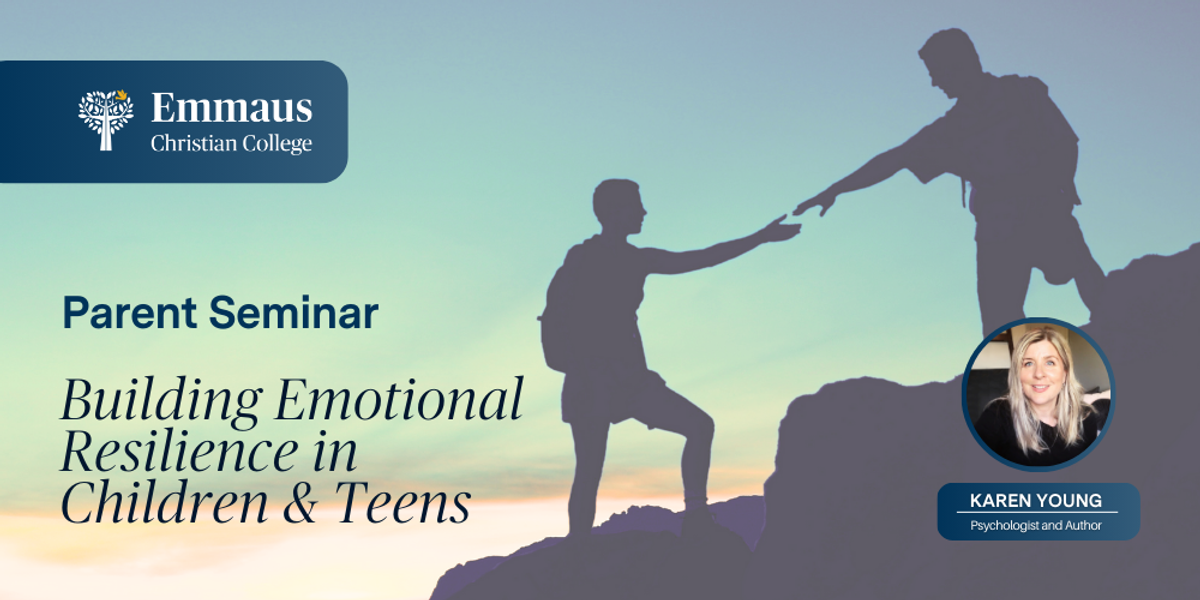Wellbeing
Tash King,Secondary Counsellor

Wellbeing
Tash King,Secondary Counsellor
On this page: Parent Seminar: Building Emotional Resilience in Children & Teens / 7 ways your child can foster connection at school


Monday 2 September
6:15pm Coffee and Community
7:00pm Start
Emmaus Performing Arts Centre
South Plympton Campus
Discover effective strategies for responding to your children when they're feeling overwhelmed, to foster calm and connection instead of conflict.
Explore powerful ways to influence the strengthening of the brain to build
self-control, emotional regulation, and resilience in your children.
Karen is a psychologist and a leading authority on child and adolescent anxiety. She is the author of five books, including ‘Hey Warrior’ and ‘Hey Awesome’ which creatively assist children to support and manage anxiety, feelings and behaviour.
Creator of HeySigmund.com, an internationally popular online resource.
Seats are limited so book early!


As we process the last two Terms and enter the hustle and bustle of Term 3, I want to share some thoughts on the importance of connection and how it can significantly enhance your child's school experience and overall wellbeing.
It is essential for your child to feel connected to their peers, teachers, and the school community to boost their emotional health and academic success. Here are seven ways they can foster these meaningful connections:
1. Embrace collaborative learning
Working together on projects and participating in group discussions can help them build strong bonds with their classmates. When they collaborate, they learn from each other, share different perspectives, and develop a sense of teamwork. Encourage your child to reach out to their peers and invite them to work on assignments together. This not only makes learning more enjoyable but also helps them form lasting friendships.
2. Seek out safe spaces
It's important for your child to have places where they feel comfortable expressing themselves. Our school offers various safe spaces, including counselling offices, learning support, and quiet spaces in the library. These are places where they can talk about their feelings, share their experiences, have alone time and connect with others who understand what they're going through. Remember to tell them that it's okay to ask for help and seek support when they need it.
3. Build positive relationships with teachers
Teachers are here to support your child, not just academically but also emotionally. Remind your child to not be afraid to approach them with concerns or to ask for advice. Building a positive relationship with their teachers can make a big difference in how they feel about school. They can offer guidance, encouragement, and sometimes just a listening ear when needed.
4. Participate in extracurricular activities
Joining clubs, sports teams, or other extracurricular activities is a great way for your child to meet new people and discover their interests. These activities provide a sense of community and belonging outside the classroom. If they're unsure which activity to join, feel free to discuss the options with your child; alternatively, our Wellbeing team or a Pastoral Coordinator can help them find something that matches their interests.
5. Engage in social-emotional learning
Understanding and managing our emotions is key to building healthy relationships. Our school offers Social-Emotional Learning (SEL) within our counselling space that teach skills like empathy, self-awareness, and effective communication. These skills will not only help them connect with others but also improve their overall wellbeing. Encourage your child to take advantage of these programs and apply what they learn in their daily interactions.
6. Involve family and community
Your child's support network extends beyond school. Involving you, your family and community in their school life can provide additional layers of support. Your child can invite you to school events, you can encourage them to participate in community service projects and share their school experiences with you. This creates a stronger sense of connection and support both at home and in school.
7. Making their voice heard
Your child's opinions and ideas matter. Our school values their input and encourages them to share their thoughts through student councils, feedback surveys, and open forums. When your child feels heard and valued, they become more connected to their school community. Encourage them not to hesitate to speak up and contribute to making our school a better place for everyone.
Romans 12:10 (NIV) "Be devoted to one another in love. Honor one another above yourselves."
Remember, our team is here to support your child every step of the way. If they ever need someone to talk to or are looking for ways to connect more deeply with their school community, please encourage them to contact our Wellbeing team.
Blessings,
Tash King
Secondary Student Counsellor